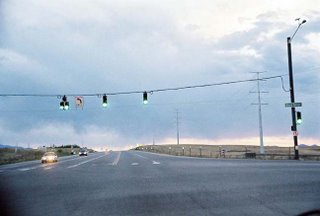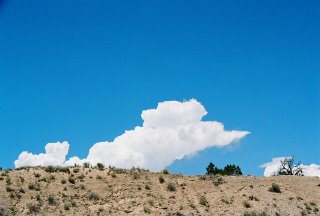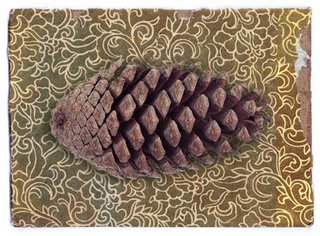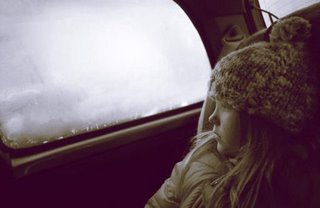Today marks one week since my father died.
It's not easy to write about my father. At least, it is not easy to write about my father in the manner people expect you to write about a father after he has passed. We did not have an easy relationship. He wasn't really such a good father.
The morning after my father died I walked seven miles before lunch. I crossed the railroad tracks to the spacious tree-lined neighborhood just east of my home, where the houses seem to preside rather than populate the streets. I usually walk in my own well-ordered neighborhood: small Craftsman homes, rope swings dangling over sidewalks, roadside vegetable gardens, beehives, bikes heaped on porches. But that morning I wanted to wander without knowing exactly where I was, so I crossed over tracks and past the golf course. The roads, no longer gridded, meandered as if they'd lost all track of time. The houses, too, were dreamlike—facades like elegant faces with half-lidded eyes, enormous shrubs like well-coiffed hair. The only people visible were landscapers armed with blowers and wackers.
I walked. Sometimes I cried. I didn't greet anyone because there was no one to greet.
When I was a child many people told me I was like my father. As I grew up this seemed to me more a burden than a boon. My father was not a happy man, and his bleak outlook on life seemed to drain joy and spontaneity from any endeavor. I did my best to not be like him, and yet many of my personality traits flowed directly from him anyway. The list of interests we shared is endless: photography, rock collecting, birding, weaving, botany, theology, paper-making, recycling, to name a few. Even making soup—the one kind of cooking I do without consulting a recipe, and by far my only polished skill in the kitchen—was one of his best as well.
Today my best friend sent me a poem. I texted her, this is the best poem ever! She replied it was written for you! But it could as well been written for my father.
T H E A R T O F D I S A P P E A R I N G
by Naomi Shihab Nye
When they say Don't I know you?
say no.
When they invite you to the party
remember what parties are like
before answering.
Someone telling you in a loud voice
they once wrote a poem.
Greasy sausage balls on a paper plate.
Then reply.
If they say We should get together
say why?
It's not that you don't love them anymore.
You're trying to remember something
too important to forget.
Trees. The monastery bell at twilight.
Tell them you have a new project.
It will never be finished.
When someone recognizes you in a grocery store
nod briefly and become a cabbage.
When someone you haven't seen in ten years
appears at the door,
don't start singing him all your new songs.
You will never catch up.
Walk around feeling like a leaf.
Know you could tumble any second.
Then decide what to do with your time.
* * * * *
I am that grocery store cabbage, ducking down the aisle to avoid neighbors. And it's safe to say that my Dad was that cabbage too. He didn't go to parties. He didn't like restaurants where the tables were close together. He was a quiet, private person; more comfortable alone than in a room of people. I am the same way: I endure parties, taking long breaks to walk outside. I have spent many a party reading in the car (I rarely feel this is a poor choice).
A few weeks ago, when my father was still able to carry on a conversation, he said something along the line of It's not easy, but that's just how it is. Life is hard. And I cringed. As a child, it was oppressive for me to hear this message over and over. Life is unfair. Life is hard. People are ungodly. People will disappoint you. I countered my Dad that day, even though I'd sort of given up on countering him at this point. My life hasn't been all that hard, I said. And it is true, all the doom and gloom I'd expected after my childhood never panned out. In fact, the opposite happened. There was so much light and beauty everywhere, people wanting me to do well. Helping me. Light pouring in every window, slipping through every chink in the wall. Some people were bad eggs, yes, and bad things happened: disappointments, heartbreaks, mistakes. But overall, the good seemed so much more substantial; the beauty so much more compelling. And somewhere along the line I found that the darkness bending around the corner was more a challenge to be met than a condition to endure.
In the last days of my Dad's life we read to him from the Chronicles of Narnia. He'd read those books to us so many times as children, and we knew he loved them. It seemed fitting to read them back to him now. And yet I puzzle over my Dad's love C. S. Lewis' imaginary Narnia—where no matter how bad things seemed there was a griddle on the stove with bacon cooking and buttered bread, where light and solemnity and joy were abundant—with his own darkly suspicious outlook. It seems to me that Lewis' fantasy world was not made up of inaccessible things: friendship, food, valor, beauty, kindness, and honor are available to almost anyone. (Well, of course I'd also like a crimson cloak, a healing cordial, and a friendship with a courtly talking mouse).
Which brings me to this: while I inherited many traits from my father, depression was not one of them. Once I was able to reject the murky worldview of my childhood, things got a whole lot better. Although I may want to hide from people in grocery stores, it's not because they are—or I am— rotten or evil. It's because I'm an introvert and find small talk exhausting. So many of the things my father seemed unable to appreciate and value in himself, I find also in myself. And yet, here's the rub: they are a source of joy and pride to me. Solace, enjoyment, meaning, hope, mastery, connection, and even professional fulfillment spring from these same traits and interests I share with my father. I protect these things in myself, finding ways to be that let them shine most fully.
That day after my Dad died, while I wandered along sloping lawns and under old maples, I opened the On Being podcast on my phone. A new podcast popped up, a conversation with the poet Naomi Shihab Nye. Nye is one of my favorite poets, and has been posted on my blog many times before. But that day she talked about a poem of hers with which I wasn't familiar: Kindness. As I walked and held the loss of my father—a loss more keen for the sad brokenness of what wasn't—her words on loss, on sorrow, and on kindness walked with me. Her voice creating a path through the sadness, like light streaming through the leaves overhead, and kindness walking beside me.
K I N D N E S S
by Naomi Shihab Nye
Before you know what kindness really is
you must lose things,
feel the future dissolve in a moment
like salt in a weakened broth.
What you held in your hand,
what you counted and carefully saved,
all this must go so you know
how desolate the landscape can be
between the regions of kindness.
How you ride and ride
thinking the bus will never stop,
the passengers eating maize and chicken
will stare out the window forever.
Before you learn the tender gravity of kindness
you must travel where the Indian in a white poncho
lies dead by the side of the road.
You must see how this could be you,
how he too was someone
who journeyed through the night with plans
and the simple breath that kept him alive.
Before you know kindness as the deepest thing inside,
you must know sorrow as the other deepest thing.
You must wake up with sorrow.
You must speak to it till your voice
catches the thread of all sorrows
and you see the size of the cloth.
Then it is only kindness that makes sense anymore,
only kindness that ties your shoes
and sends you out into the day to gaze at bread,
only kindness that raises its head
from the crowd of the world to say
It is I you have been looking for,
and then goes with you everywhere
like a shadow or a friend.
A few weeks ago, when my father was still able to carry on a conversation, he said something along the line of It's not easy, but that's just how it is. Life is hard. And I cringed. As a child, it was oppressive for me to hear this message over and over. Life is unfair. Life is hard. People are ungodly. People will disappoint you. I countered my Dad that day, even though I'd sort of given up on countering him at this point. My life hasn't been all that hard, I said. And it is true, all the doom and gloom I'd expected after my childhood never panned out. In fact, the opposite happened. There was so much light and beauty everywhere, people wanting me to do well. Helping me. Light pouring in every window, slipping through every chink in the wall. Some people were bad eggs, yes, and bad things happened: disappointments, heartbreaks, mistakes. But overall, the good seemed so much more substantial; the beauty so much more compelling. And somewhere along the line I found that the darkness bending around the corner was more a challenge to be met than a condition to endure.
In the last days of my Dad's life we read to him from the Chronicles of Narnia. He'd read those books to us so many times as children, and we knew he loved them. It seemed fitting to read them back to him now. And yet I puzzle over my Dad's love C. S. Lewis' imaginary Narnia—where no matter how bad things seemed there was a griddle on the stove with bacon cooking and buttered bread, where light and solemnity and joy were abundant—with his own darkly suspicious outlook. It seems to me that Lewis' fantasy world was not made up of inaccessible things: friendship, food, valor, beauty, kindness, and honor are available to almost anyone. (Well, of course I'd also like a crimson cloak, a healing cordial, and a friendship with a courtly talking mouse).
Which brings me to this: while I inherited many traits from my father, depression was not one of them. Once I was able to reject the murky worldview of my childhood, things got a whole lot better. Although I may want to hide from people in grocery stores, it's not because they are—or I am— rotten or evil. It's because I'm an introvert and find small talk exhausting. So many of the things my father seemed unable to appreciate and value in himself, I find also in myself. And yet, here's the rub: they are a source of joy and pride to me. Solace, enjoyment, meaning, hope, mastery, connection, and even professional fulfillment spring from these same traits and interests I share with my father. I protect these things in myself, finding ways to be that let them shine most fully.
That day after my Dad died, while I wandered along sloping lawns and under old maples, I opened the On Being podcast on my phone. A new podcast popped up, a conversation with the poet Naomi Shihab Nye. Nye is one of my favorite poets, and has been posted on my blog many times before. But that day she talked about a poem of hers with which I wasn't familiar: Kindness. As I walked and held the loss of my father—a loss more keen for the sad brokenness of what wasn't—her words on loss, on sorrow, and on kindness walked with me. Her voice creating a path through the sadness, like light streaming through the leaves overhead, and kindness walking beside me.
K I N D N E S S
by Naomi Shihab Nye
Before you know what kindness really is
you must lose things,
feel the future dissolve in a moment
like salt in a weakened broth.
What you held in your hand,
what you counted and carefully saved,
all this must go so you know
how desolate the landscape can be
between the regions of kindness.
How you ride and ride
thinking the bus will never stop,
the passengers eating maize and chicken
will stare out the window forever.
Before you learn the tender gravity of kindness
you must travel where the Indian in a white poncho
lies dead by the side of the road.
You must see how this could be you,
how he too was someone
who journeyed through the night with plans
and the simple breath that kept him alive.
Before you know kindness as the deepest thing inside,
you must know sorrow as the other deepest thing.
You must wake up with sorrow.
You must speak to it till your voice
catches the thread of all sorrows
and you see the size of the cloth.
Then it is only kindness that makes sense anymore,
only kindness that ties your shoes
and sends you out into the day to gaze at bread,
only kindness that raises its head
from the crowd of the world to say
It is I you have been looking for,
and then goes with you everywhere
like a shadow or a friend.











